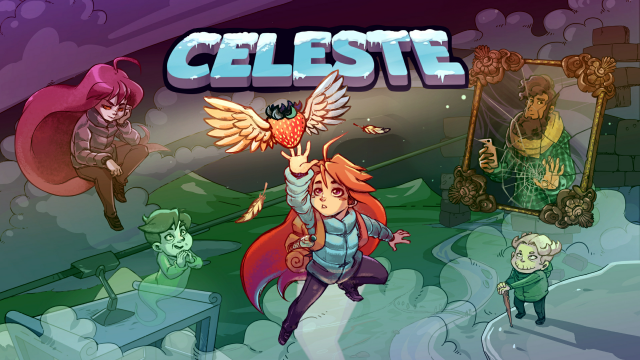Celeste Review

Published: 2/1/2019
Release Date: 1/25/2018
Played On: Switch
Mental health can be a difficult subject to discuss. It’s a lifelong affliction that affects millions of people on a daily basis and its portrayal in popular media has come to shape the public’s opinion on the matter quite a bit. Sometimes this is beneficial, as it can spread awareness and encourage those in need to seek help, but it can also lead to misinformation.
In the gaming industry we’ve seen a few games attempt to tackle the subject with mixed results. There have been successes, but the majority fail to accurately portray the topic or refuse to treat it with the gravity that it deserves. This is where Celeste comes in.
The last place one might expect to find a moving narrative, Celeste is an 8 bit platformer released on January 25th this year. It follows the player-named protagonist on their journey to climb Celeste mountain. And if this game were to be summed up in two words, they would be “deceptively simple.” The gameplay, story, themes, and characters are all pretty basic at their core, but over the course of the game each is explored, expanded upon, and (for the most part) achieves its maximum potential.
In terms of the story, this extend is reached through a clever use of foreshadowing and metaphors. It begins with the protagonist (who shall henceforth be known as Madeline as that’s her canon name) standing at the foot of the mountain, determined to reach the peak. She meets an old woman who mocks her for having such ambitions and sets off.
From here, the game seems to be about a young woman’s quest to climb with little else to focus on aside from a couple of whacky side characters, but eventually grows to something much deeper as her depression physically manifests and tries to prevent her from reaching her goal.
The interactions between Madeline and her depression are what really bring this game to life. It goes from a simple story about a girl climbing a mountain to a more personal tale about a person’s struggle with depression and the ways that the two characters speak to one another are both engaging and heartbreaking.
The other characters are great too. The old woman shows up a few times and while she definitely falls into the “crazy old person who turns out to be wise” trope, she’s an entertaining and occasionally funny addition to the cast. Mr. Oshiro, the ghost of a hotel owner with a split personality, is a welcome addition, but his plot significance is minimal as he only plays a major part in one chapter and doesn’t add much to the game’s subtext.
The star amongst the side characters however, is Theo. A chill photographer from Seattle who’s trying to climb the mountain in search of the ultimate selfie. His relationship with Madeline is well developed and a joy to see grow and form. His scenes can be comedic, somber, and thoughtful, bringing an unexpected third dimension to the characterization of a character who otherwise resides in two.
I won’t go into much more detail in fear of spoilers, but just know that while the story is scarce, it’s also a mature, entertaining, and emotional tale that nearly anyone can relate to. Its relation to mental health and message of overcoming your depression and anxiety is poignant and concise without affecting the story negatively, getting in the player’s face, or interrupting the flow of gameplay.
Celeste
Celeste is a breath of fresh air. A game that's simultaneously engaging, thrilling, moving, and frustrating I never once wanted to put down the controller while playing.
